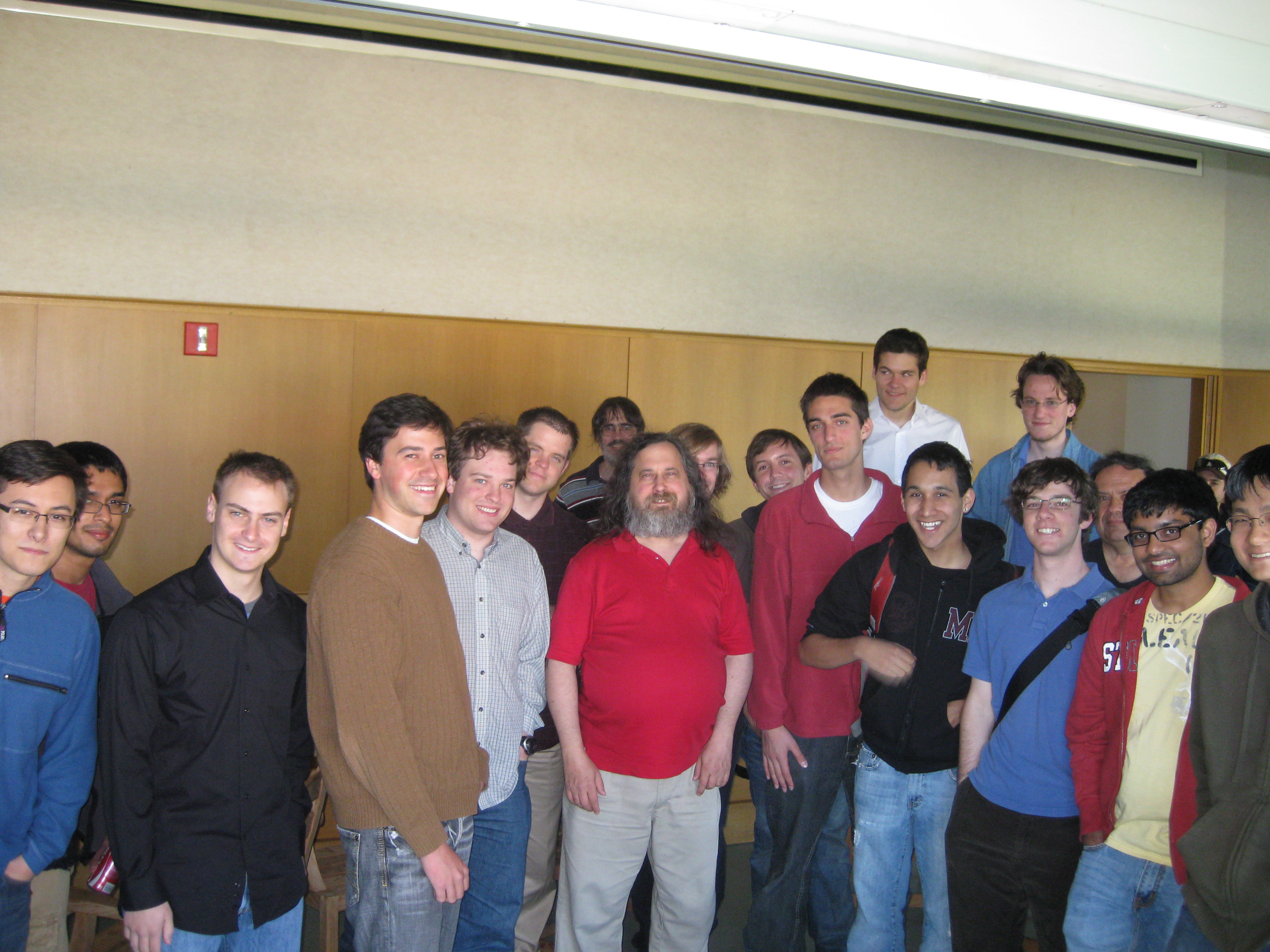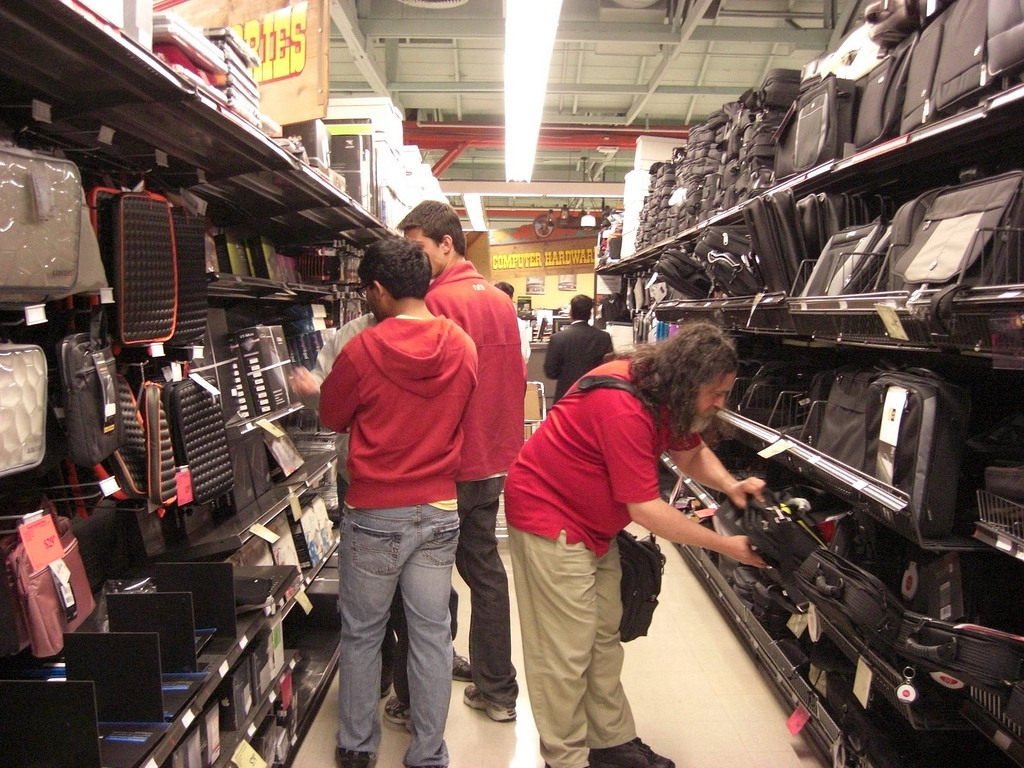A few weeks ago, I had the amazing opportunity to meet Richard Stallman – founder of the GNU Project and Free Software Foundation, and developer of the amazingly popular GNU Emacs, GNU compiler gcc, and GNU debugger gdb.
Richard Stallman at Stanford:

RMS, as he likes to be called, is a living legend in the computing field. He’s widely considered to be the father of the free software movement. There is no question that the free software philosophy has brought enormous amounts of good to the world. I firmly believe this. I think most programmers and computer scientists would agree, too.
I decided to invite him to come to Stanford to give a talk about his ideas. He replied and let me know that he was already planning to speak at Stanford to students of the CS302: Tech Law course. I was thrilled! But, I wanted to help out in some way.
So, I got the Stanford ACM to host a public reception for RMS on the day before his talk, so that students from the community could meet him and ask questions. Some friends at Yahoo even heard about the event and offered to sponsor it and pay for all our food, which was extremely kind.
RMS is one of the most unique men I’ve ever met. Over thirty years after the decade of hackers, RMS still embodies the spirit of the 70’s hacker culture. He’s often criticized for being too extreme with his viewpoints. But, I think that’s what makes him unique.
RMS is an extremist in the cause of freedom. And there aren’t many people like that left in this world.
The spread of free software
Free software is everywhere today. The popular operating system GNU/Linux (which Stallman wrote large parts of) powers so much of our computing today, nearly everyone has used it, whether they’ve heard of it or not.
The majority of servers on the Internet are powered by Apache and GNU/Linux, major parts of the Internet and most networks in large corporations are powered by GNU/Linux, and even 95% of the desktops and servers at major Hollywood movie studios like Disney, Pixar, DreamWorks, and Sony run GNU/Linux.
Many people are confused about what the phrase “free software” means. Before I continue, let’s be clear about the definition of free software.
Free Software Definition
From Richard Stallman himself:
“Free software” is a matter of liberty, not price. To understand the concept, you should think of “free” as in “free speech,” not as in “free beer.”
Free software is a matter of the users’ freedom to run, copy, distribute, study, change and improve the software. More precisely, it means that the program’s users have the four essential freedoms:
- The freedom to run the program, for any purpose.
- The freedom to study how the program works, and change it to make it do what you wish. Access to the source code is a precondition for this.
- The freedom to redistribute copies so you can help your neighbor.
- The freedom to distribute copies of your modified versions to others. By doing this you can give the whole community a chance to benefit from your changes. Access to the source code is a precondition for this.
(from The Free Software Definition)
I recently watched an excellent documentary about early hacker culture called Hackers: Wizards of the Electronic Age which had several wonderful clips of RMS in his early years. I clipped a relevant clip out of the documentary and uploaded it to YouTube:
Again, in Stallman’s own words:
Proprietary Software
So, free software sounds pretty good, right? I wish all software was free software. Nearly all computer users, however, use the opposite of free software, called proprietary software, all the time in their daily lives. Mac OS X, Microsoft Windows, Microsoft Office, and many, many other programs are all proprietary software.
With proprietary software, we users have no way to determine what our software is doing on our computers because we can’t examine the source code. The software might be extremely insecure and exposing us to all sorts of security risks and we’d never know about it. Proprietary software may also send data about us back to the software company, or contain malware that allows the software company or even the government to gain remote access to our computers. Think these suggestions are far-fetched? Think again. This stuff has happened and continues to happen – just do some research.
Another downside of non-free software is that if there’s a problem with it, a feature that’s missing, or something that we’d like to change, we’re at the mercy of the software company to implement these changes. When you take the shrink-wrap off that box of proprietary software, you’re agreeing that you will use the program as-is and won’t try to modify how the program behaves or reverse-engineer it to extract the source code. No software company that respects its users’ freedom would force such a scheme upon them.
Proprietary software also restricts sharing and copying. Users of proprietary software are legally forbidden from sharing their software with their neighbors. Users who share their proprietary software with their neighbors and friends are called “pirates,” “counterfeiters,” and “thieves” – propaganda terms used by the RIAA, MPAA, and other media conglomerates to demonize the simple act of sharing knowledge. Sharing a software program with your friend is not “piracy” – it is simply not the same as robbery and criminal violence on the sea. Not even close.
Sharing is caring
Why are these media and software companies trying to make sharing – that good thing that we learned about as children – into something bad and nasty, to use Stallman’s own words?
Sharing is good. Sharing knowledge is better. Sharing software that empowers people to improve their lives is best.
I’ve already written about misinterpreting copyright and why copying is not theft in other blog posts – check them out if you’re interested.
These are just a few of the ethical reasons why free software is better than proprietary software. There are a whole host of technical reasons why it’s better, too. Free software source code can be scrutinized by more eyeballs, so it’s less likely to try to employ security through obscurity. Critical security bugs get patched much more quickly – often within hours – so free software is usually more secure than proprietary software.
And the list of free software benefits goes on… but I digress.
Odious ideas are not entitled to hide from criticism behind the human shield of their believers’ feelings. — Richard Stallman
One more photo
Stallman looking for a new laptop case at Fry’s Electronics in Palo Alto. His bag ripped earlier in the day, so we took him to Fry’s.

(If you liked this, you might like Freedom of Speech on the Internet.)
